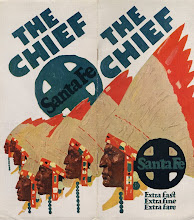Charles Heck arrived at the library with an interest in social and environmental considerations in the development of the Brazilian city of Rio de Janeiro, as well as its notorious favelas. While our own collection trails off pretty quickly in the post-war period, we were able to direct the student to a large collection of architecture slides taken by one of the Wolfsonian’s former fellows, Eric Dluhosch. Professor Dluhosch, who retired a few years ago from teaching at MIT in Cambridge, Massachusetts, traveled extensively across the globe and spent time in Brazil at architecture conferences that investigated various social housing experiments and documented the development of slums in that and other Latin American countries. His large collection of architectural slides was donated to Florida International University some years ago and is in the process of being digitized for use by the university’s School of Architecture. The student may have the opportunity to meet with and interview Dr. Dluhosch directly as he is escaping the snowiest and the coldest of the winter months down here in sunny Miami Beach. Of course, there were also items in our own collection that addressed some of the student’s research concerns as well including the brochure pictured above.
Later that afternoon, Professor Dennis Wiedman directed another of his students, Benjamin Augustyn, to our library to discover what materials might be available for researching his topic of colonial tourism. While the student had originally been focused on some of the colorful travel posters of the interwar period, (of which there are many in our museum), he soon learned that there was a wealth of related materials in other formats (brochures, advertisements, menus, postcards) available for direct consultation in our library, or else easily viewed on the internet via our web OPAC and virtual library displays: ( http://207.67.203.78/W10054 ; http://www.librarydisplays.wolfsonian.org ) As the Wolfsonian founder, Mitchell Wolfson, Jr. happened to be in town, we were also able to set up an interview with the original collector of the materials. Here are a few samples of some of the colonial tourist trade materials to be found in our rare books library.








No comments:
Post a Comment